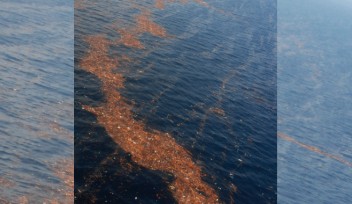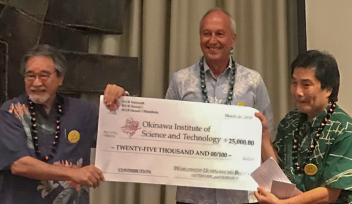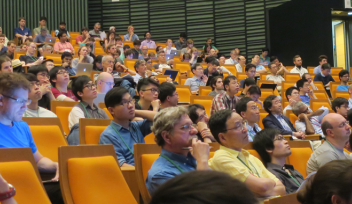Life after a PhD: OIST alumni give advice to current students

In May, six alumni who completed their doctorates at the Okinawa Institute of Science and Technology Graduate University (OIST) returned to Okinawa to join the graduation ceremony, celebrate the 10th anniversary, and give workshops on what to expect after a PhD, targeting the current students.
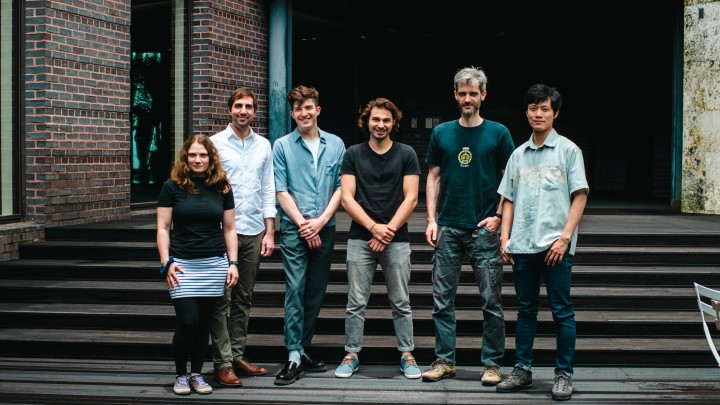
From left: Dr. Irina Reshodko, Dr. Leonidas Georgiou, Dr. Adrian David, Dr. Thomas Nieddu, Dr. Stefan Pommer, and Dr. Jiabao Chen. They gave workshops on what to expect after a PhD when they visited OIST after their graduation.
The first workshop was delivered by Dr. Stefan Pommer, who completed his PhD in the Neurobiology Research Unit, and Dr. Thomas Nieddu, who was formally part of the Light-Matter Interactions for Quantum Technologies Unit. Since leaving OIST, both Dr. Pommer and Dr. Nieddu have joined laboratories as postdoctoral researchers in Europe.
Dr. Pommer finished his PhD and left Okinawa in 2020, returning to Germany amidst the first year of the COVID-19 pandemic for a postdoc in neuroscience at Universtätsmedizin Göttingen. “I wanted to apply the knowledge skills and training I had learnt. My background was in molecular biology and, at OIST, I had the chance to go into neuroscience. It was a very niche and tricky part of neuroscience. I put the effort in, learned it, and I wanted to use that skill.”
After completing his PhD in 2020, Dr. Nieddu moved to France and joined the Laboratoire Kastler-Brossel as a Postdoctoral Researcher in quantum optics.
He highlighted the several key differences between a PhD at OIST and a postdoc in Europe. At OIST, he was given the freedom to set up his own experiment, which came with a variety of challenges and taught him how to work independently. But as a postdoctoral researcher, Dr. Nieddu has joined an established experiment, and a key part of the role involves supervising PhD students. He also noted the difference in facilities compared to OIST.
“Once I joined my lab in France, which is world renowned, I realized how state-of-the-art the facilities at OIST are. Everything is controlled and the facilities at OIST prevents anything from going out of power in your lab, so your experiment is always safe."
The second workshop was delivered by Dr. Irina Reshodko, who was part of the Quantum Systems Unit, and Dr. Jiabao Chen, formally part of the Quantum Dynamics Unit. Both moved to industry once completing their PhDs.
Dr. Reshodko lives in Norway where she holds dual roles as AI team leader at Norwegian AI company WAY where she leads a team that is building a virtual driving instructor using a simulator platform and as a visiting researcher at Norwegian University of Science and Technology. Her work at WAY, which seeks to develop a virtual driving education scheme, saw her transition from theoretical quantum physics to AI.
She shared lessons that she learned the hard way: “i move is more expensive than you think, ask for relocation support. Always ask for a higher salary but think about good timing for the company. And don’t start irreversible steps, such as signing a contract for a house before you have a job offer on paper.”
Dr. Chen is now a quantum computing software engineer at QunaSys, a company based in Tokyo that is developing a cloud-based service that seeks to maximize the power of quantum computing.
“Almost everything I learned at OIST is useful for my current work, even the neuroscience and machine learning that didn’t end up in my thesis,” said Dr. Chen. “When I encounter problems in those spaces, I can almost understand them intuitively. I was lucky to learn in a place without artificial boundaries.”
Dr. Chen went on to point out that professional life isn’t so different but one key difference is the mindset. “When I wrote my thesis and papers, I found that it was good to be a bit of a perfectionist. In industry, I consider more how to provide value in a reasonable timeframe. Instead of doing every step perfectly, I consider how to provide a minimal viable project in each step, something that is 80% good.”
The final workshop was delivered by Dr. Leonidas Georgiou, formally in the Optical Neuroimaging Unit and now a Life Science Venture Capital Analyst at Hadean Ventures in Norway, and Dr. Adrian David, formally in the Mathematical and Theoretical Physics Unit and now the Head of Operations at Upgrade Education in Romania.
Hadean Ventures finds promising biotechnology startups in Europe to invest in. As a venture capital analyst, Dr. Georgiou meets with company representatives to discuss a potential project, analyzes and evaluates the company to decide if they should invest in it, and manages a portfolio of companies that have received the funding.
“I decided to choose a path that would enable me to create as much value for the world as I could,” stated Dr. Georgiou. “A PhD is very useful. It is often the minimum requirement in biotech venture capital.”
He went on to start that with all the resources available today, one can learn pretty much anything to help them achieve their goals. “But not everything, you need to choose.”
Dr. David talked about how the soft skills he learned at OIST, such as communication, conflict management, and time management have been very useful in his new role mentoring high school students and managing operations at Upgrade Education.
“I was very involved in the community at OIST. I spent four years on the student council and initiated the peer support system. I found that I really like working with people.”
His advice: “Network hard and often. Reach out, ask, be persistent. And always have a backup plan in case you choose to leave academia.”
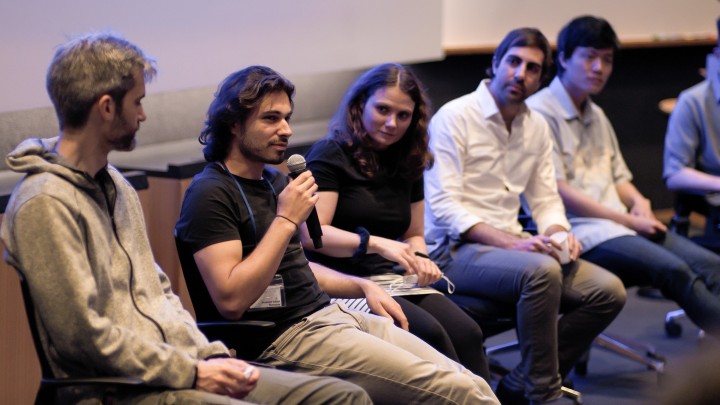
A panel discussion during the alumni workshops.
Over the next few years, as OIST’s graduates spread across the world, OIST looks forward to continuing to maintain a connection with them and hearing about their future endeavors.
For press enquiries:
Press Inquiry Form










